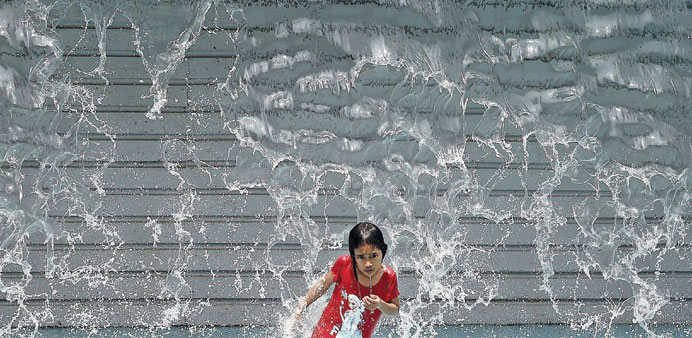A young girl plays in an artificial waterfall on a hot day in Kuala Lumpur. World Water Day is observed today. The theme for 2015 is “Water and Sustainable Development”.
By Mohamed Abdel Raouf/Jeddah
On March 22 every year, the world observes World Water Day (WWD). In fact, this is the most important environmental occasion for humanity as it deals with water, the most precious natural resource on the surface of Earth.
World Water Day seeks to remind people about the significance of freshwater and promote sustainability for freshwater resources management through events. These include, for instance, visual art exhibits; theatrical and musical celebrations of water; research and photo contests on issues related to water; and symposia for local, national, and international stakeholders on water management.
In addition, educational events, campaigns, excursions to local rivers and lakes and special broadcasts on television and radio stations about water resources are also organised.
WWD this year is very important for the world and the Arabian Gulf region because:
l The theme for 2015 is “Water and Sustainable Development”. Water plays the key role in sustainable development and the availability of water resources can often determine development plans. Water is critical to meeting basic human needs, of course; besides, water supply and sanitation services as well as water as a resource are crucial to sustainable development.
l The current year marks the end of the UN Water for Life Decade (2005-2015). The Water for Life Decade encourages co-operation on water especially in regions that share similar problems and resources.
l For decades, the limited availability of freshwater has presented a major challenge for the people and governments of the Gulf region. Scarce rainfall together with a high rate of evaporation and consumption leads to deficits in the water budgets of the GCC countries. Excess water consumption presents a huge problem in these countries. According to the UN, all the GCC countries, except Oman, fall in the category of “acute scarcity”.
l In order for the GCC countries to maintain their rapid development in all aspects of life, they must take all necessary measures to guarantee the availability of water resources for various uses. Otherwise, the region is very likely to face many potential problems arising out of water availability issues impacting the security, economic and social fronts.
The GCC countries face the same environmental challenges, especially in the water sector. They also share underground aquifers and therefore must work together to better utilise these in a sustainable way.
GCC-wide co-operation and joint projects will ensure that the possible consequences of water policies are anticipated and examined, and water issues are included in the countries’ development strategies and plans.
There is plenty of room for co-operation on many aspects related to the water sector such as monitoring and utilisation of groundwater tables, recycling, water desalination and use of renewable energies in water desalination. Co-operation in the water sector will definitely contribute to equity, create economic benefits, help preserve water resources and protect the environment.
Experience has shown that specific environmental problems such as those relating to water are usually better addressed by employing a “policy mix”, consisting of various command and control instruments (penalties and fines), economic instruments (incentives), and awareness and educational programmes.
It is worth mentioning in this regard that, when applying water tariffs for various users, it is better to use an increasing block rate tariff and seasonal rates, as such tariffs encourage users to rationalise water usage.
Needless to say, in Islamic societies such as in the GCC, efforts to increase awareness and find solutions to water scarcity should have been easy because of religious reasons as many Qur’anic verses encourage the preservation of water. The use of religious guidelines must be an integral part of any awareness campaign.
A competent strategy to tackle water security from both the supply and demand sides is necessary for ensuring that development is sustainable in the Gulf region.
Since water is life and needed for all human and development activities, the GCC states must work to provide good quality water for their people in the right quantity to prevent water issues from causing unrest as has happened in many countries of the Middle East in the last few years. Thus, the issue of water security has to be at the forefront of the GCC policy agenda.
There is no doubt that co-operation on water is a step in the right direction and World Water Day is a good occasion to get started.
♦ Dr Mohamed Abdel Raouf is a research fellow in the Environmental Research Programme of the Gulf Research Center in Jeddah.

